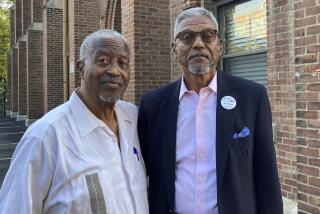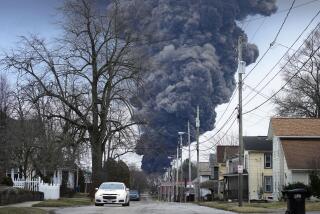And Still the Survivors Wait : Snarled compensation in Bhopal underlines the problems that retard India
- Share via
Nearly 10 years have passed since that awful night when lethal, milky-white fumes seeped out of the Union Carbide fertilizer plant in the central Indian city of Bhopal, crept stealthily into the pathetic cardboard shacks of the adjoining slum called J. P. Nagar and dealt terrifying deaths to the sleeping residents.
Reporters who rushed there the next day found a horrifying scene: draped corpses on funeral pyres, wheezing survivors of the asphyxiating gas, hapless lines before makeshift outdoor clinics.
Later came the flocks of American liability lawyers looking to make a killing of their own.
The reporters and the international ambulance-chasers are long gone now. But the Bhopali victims remain. And with a dreary predictability, impoverished survivors and families of the dead still await proper compensation--five years after the Union Carbide Corp. of Connecticut agreed to a $470-million settlement with the Indian government. Only about $100 million has yet been paid out.
The reasons for this speak volumes about the endemic corruption that, 47 years after independence from Britain, still retards India’s efforts to modernize its economy and corrodes its vaunted democracy. A sclerotic bureaucracy affects all aspects of life. By one estimate, 20% to 30% of the Carbide money paid out so far has evaporated in the form of bribes to government officials, magistrates, lawyers, doctors, even secretaries and clerks. Meanwhile, some of the most severely disabled are under intense pressure to accept minimal awards and subsist in their hovels unless they pay kickbacks to get more.
From the beginning, it was apparent this would happen. Just days after the tragedy, a clerk in a municipal government office in Bhopal wheedled an $8 bribe from an American reporter for an English-language version of the city’s master plan, which showed that Union Carbide had been allowed to violate numerous laws to put its plant so close to an urban center.
And very soon many residents of Bhopal, a rather pretty city of elegantly manicured parks draped over hills and surrounding two picturesque lakes, were claiming compensation for everything from lumbago to psoriasis. There are 639,000 personal injury claims in a city of 1.6 million, most of them obviously bogus. With bodies quickly cremated, no one will ever know how many really died, but the figure was at least 2,000, perhaps 4,000 or so.
Over the last two years, Prime Minister P. V. Narasimha Rao of the Congress (I) Party has made substantial economic reforms, trying to free the economy from state control to make India more inviting to foreign investors and to entrepreneurial growth. Those reforms are welcome, but the depressing Bhopal story suggests that it will take much more.
More to Read
Sign up for Essential California
The most important California stories and recommendations in your inbox every morning.
You may occasionally receive promotional content from the Los Angeles Times.













